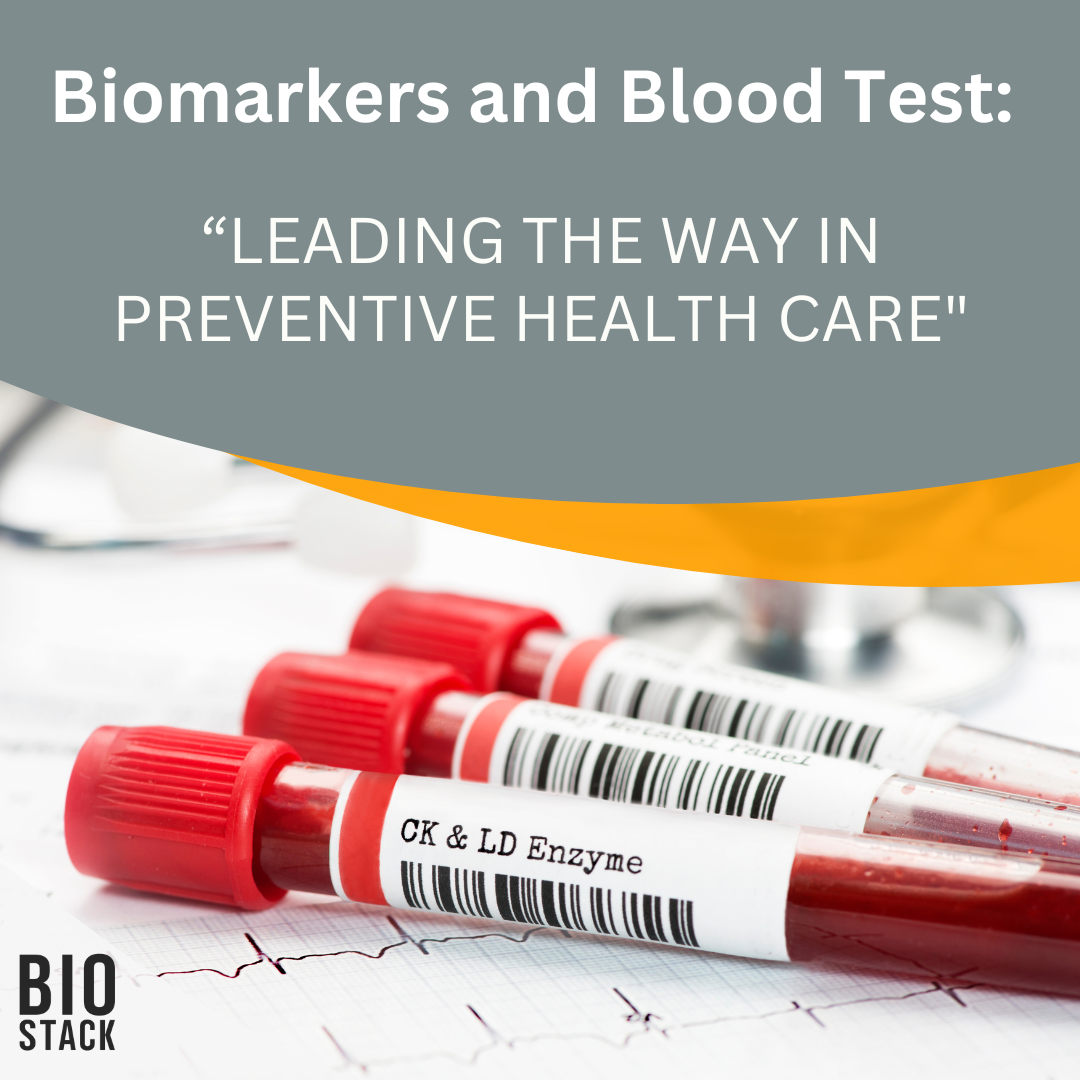
"Biomarkers and Blood Tests: Leading the Way in Preventive Health Care"
Share
The Rise of Biomarkers: Taking Charge of Health with Preventive Blood Tests
In an era where technology is transforming every aspect of our lives, the field of healthcare is no exception. One of the most promising advancements in recent years is the increasing use of biomarkers, particularly through blood tests, to monitor and manage health proactively. The focus is shifting from merely treating diseases to preventing them, marking a significant paradigm shift in the approach to healthcare. This shift towards preventive healthcare, fuelled by the growing popularity of biomarker testing, empowers individuals to take charge of their health and well-being more effectively than ever before.
Understanding Biomarkers and Their Importance
Biomarkers, short for biological markers, are measurable indicators found in blood, other body fluids, or tissues that provide information about a person's health. They can reflect normal biological processes, pathogenic processes, or responses to therapeutic interventions. In simple terms, biomarkers are like health indicators that can reveal the state of your health at a given time, identify risks of developing certain conditions, and monitor the effectiveness of treatments.
Blood tests have long been a staple in diagnostic medicine, but the depth and breadth of information they can now provide have expanded dramatically. Thanks to advances in medical research and technology, a single blood test can measure a wide range of biomarkers, offering a comprehensive view of an individual's health. These tests can detect early signs of diseases, including cardiovascular issues, diabetes, cancer, and even mental health conditions, before symptoms become apparent.
The Shift Towards Preventive Healthcare
Traditionally, healthcare has been reactive, focusing on treating diseases and symptoms after they have already appeared. However, this approach has limitations, including higher healthcare costs, reduced quality of life, and less favourable outcomes. On the other hand, preventive healthcare emphasizes early detection, risk assessment, and lifestyle modifications to prevent diseases from developing in the first place. This proactive approach can lead to better health outcomes, lower medical expenses, and a longer, healthier life.
The increasing popularity of biomarker testing is closely linked to this shift towards preventive healthcare. By identifying potential health risks early, individuals can take steps to mitigate those risks before they become serious health problems. For example, knowing that one's cholesterol levels are elevated allows a person to adopt dietary changes, exercise more, or take medications to reduce the risk of cardiovascular disease. Similarly, detecting high blood sugar levels early can lead to lifestyle adjustments that prevent the onset of type 2 diabetes.
How Biomarkers Empower Individuals
Biomarker testing is more than just a medical tool; it empowers individuals to take control of their health. By providing detailed insights into one's biological state, biomarkers offer valuable information that can guide health decisions. Here’s how biomarkers are making a difference:
-
Personalized Health Management: Biomarkers provide a snapshot of an individual's health, allowing for personalized health strategies. Rather than relying on generalized guidelines, individuals can make health choices based on their specific biomarker data. This can lead to more effective diet plans, exercise routines, and medical interventions tailored to their unique needs.
-
Early Detection and Prevention: One of the most significant benefits of biomarker testing is its ability to detect potential health issues before they become serious. For instance, elevated levels of certain biomarkers can indicate the early stages of heart disease, cancer, or metabolic disorders. By identifying these risks early, individuals can take preventive measures, such as lifestyle changes or medical treatments, to avoid or delay the onset of disease.
-
Monitoring Health Over Time: Regular biomarker testing allows individuals to track their health over time. This is particularly valuable for those managing chronic conditions or those at risk of certain diseases. By monitoring changes in biomarker levels, individuals and their healthcare providers can adjust treatment plans and lifestyle choices to optimize health outcomes.
-
Encouraging Healthy Behaviour: Awareness of one’s biomarker status can motivate individuals to adopt healthier behaviours. When people see tangible evidence of how their lifestyle choices impact their health (e.g., improvements in blood sugar levels with diet and exercise), they are more likely to continue those behaviours.
-
Reducing Healthcare Costs: Preventive care is often more cost-effective than treating diseases after they develop. By catching health issues early and avoiding serious conditions, biomarker testing can help reduce overall healthcare costs for individuals and the healthcare system as a whole.
Popular Biomarkers to Test
Several biomarkers are commonly measured through blood tests to provide insights into various aspects of health. Here are some of the most well-known biomarkers that play a crucial role in preventive healthcare:
-
Cholesterol Levels (Total Cholesterol, LDL, HDL, Triglycerides): Cholesterol levels are a critical indicator of cardiovascular health. High levels of LDL (low-density lipoprotein) cholesterol and triglycerides can increase the risk of heart disease, while higher levels of HDL (high-density lipoprotein) cholesterol are protective. Regular monitoring can help manage heart disease risk.
-
Blood Glucose Levels (Fasting Blood Sugar, HbA1c): These biomarkers are essential for assessing diabetes risk. Fasting blood sugar provides a snapshot of current blood sugar levels, while HbA1c reflects average blood sugar levels over the past two to three months. Elevated levels may indicate prediabetes or diabetes.
-
C-Reactive Protein (CRP): CRP is a marker of inflammation in the body. High levels of CRP can indicate the presence of inflammation, which is associated with a higher risk of chronic diseases such as heart disease, cancer, and autoimmune conditions.
-
Hormone Levels (Thyroid Hormones, Testosterone, Estrogen): Hormones regulate many bodily functions, and imbalances can lead to various health issues. For example, thyroid hormone levels can indicate thyroid function, while testosterone and estrogen levels provide insights into reproductive health and overall hormonal balance.
-
Vitamin D Levels: Vitamin D is crucial for bone health, immune function, and overall well-being. Low levels of vitamin D are linked to various health problems, including osteoporosis, cardiovascular disease, and weakened immune response.
-
Complete Blood Count (CBC): A CBC measures different components of the blood, such as red blood cells, white blood cells, and platelets. It provides essential information about overall health and can detect conditions such as anemia, infections, and blood disorders.
-
Liver Function Tests (ALT, AST, ALP, Bilirubin): These biomarkers assess liver health. Elevated levels can indicate liver inflammation, damage, or disease, making them valuable for monitoring liver function and detecting liver conditions early.
-
Kidney Function Tests (Creatinine, BUN): These biomarkers help evaluate kidney health. Abnormal levels can indicate kidney dysfunction or damage, which may require medical intervention.
-
Lipid Profile: Beyond cholesterol, a lipid profile can include markers like apolipoprotein B (ApoB), which provides a more detailed assessment of cardiovascular risk by measuring the particles that carry cholesterol in the blood.
-
Homocysteine: Elevated levels of homocysteine are associated with a higher risk of cardiovascular disease. Monitoring this biomarker can help manage heart health more effectively.
The Future of Biomarker Testing
The growing popularity of biomarker testing reflects a broader shift in how we view health and wellness. As technology advances, the accuracy, accessibility, and affordability of biomarker tests will likely continue to improve. This will enable even more people to benefit from preventive healthcare.
Emerging technologies such as artificial intelligence (AI) and machine learning are expected to play a significant role in the future of biomarker testing. These technologies can analyze vast amounts of biomarker data, identifying patterns and predicting health outcomes with greater precision. This can lead to more personalized and targeted preventive strategies, further enhancing the effectiveness of biomarker-based healthcare.
Moreover, as people become more proactive about their health, the integration of biomarker testing into routine medical care will likely become more common. This shift will encourage a more comprehensive and holistic approach to health, focusing on prevention, early detection, and personalized care.
Taking Charge of Your Health
The rise of biomarker testing marks a significant advancement in the field of healthcare, empowering individuals to take charge of their health like never before. By providing valuable insights into one's biological state, biomarkers allow for early detection of potential health issues, personalized health management, and effective prevention strategies. As preventive healthcare becomes more than just a trend, the use of biomarkers will continue to grow, helping more people lead healthier, longer, and more fulfilling lives.
Incorporating regular biomarker testing into your health routine is an investment in your future well-being. It’s about staying informed, making proactive choices, and taking control of your health journey. As the saying goes, "Prevention is better than cure," and with the power of biomarker testing, we can make that saying a reality.
